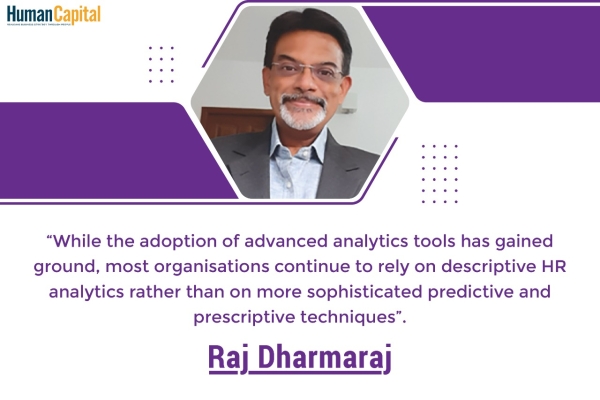Post-Pandemic Talent Management will see a sharper focus on employee experience. With less talent and the same work to be done, employers will have to find ways and means to enhance superior employee experience in all aspects of the HR function.
We will remember the year 2020 for life when the Global Pandemic taught us lessons which we never learnt in B Schools. Among other facets of Human Resources, Talent Management too will have to be rethought and re-defined in the post pandemic era.
Wikipedia defines Talent Management as anticipating requisite human capital and planning to fulfil those requirements for a company. Everything done to recruit, retain, develop, reward and make people perform forms a part of talent management as well as strategic workforce planning. Talent management is an organisation’s ability to recruit, retain, and produce the most talented employees available in the job market.
Talent Management is an enviable skill to possess, and though it may not be an arduous uphill climb to scout out new and good talent, it is a challenge to retain them. The crux of the matter is that no one wants to lose talented and hardworking employees.
However, most of those people are either satisfied with the job they have, or they go out and look for better opportunities.
We will always remember the year 2020 as the Global Pandemic taught us lessons which we never learnt in B Schools. And among several aspects, Talent Management too will have to be re-thought and re-defined in the post-pandemic era.
Let’s take a look at how Talent Management will recast itself in the post-pandemic era.
Recruit:
The Pandemic has created a borderless world. Organisations were forced to allow employees to work from home, a prerogative earlier restricted to the IT Sector. Today, many organisations are allowing employees to work from home. The only requirements being basic IT facilities, WIFI / Internet connection, a corner to work and technology to aid and facilitate work.
Retaining Employees will be more challenging. Managers will have to hone their humane skills. Empathy and passion will have to be practised and demonstrated by Managers in the postpandemic era.
Recruitment will undergo a sea change. Apart from virtual interviews organisations have now an opportunity to tap manpower from different locations which earlier had to be restricted to a particular city or would call for relocation of people to different areas/cities in search of jobs. We now hear people being hired from far-flung areas and working for organisations in metros.
Time zones may be one bit of consideration but companies are hiring people from different areas and I have even heard some companies talking about “Work from Mountains”. This, I see as a positive side of the pandemic wherein people from Tier 2 and Tier 3 cities can also get an opportunity to work for big corporates without shifting their base and meeting their organisational aspirations. It has been a win-win for both employers and employees. Employers are getting to tap cheap and talented resources and employees getting a chance to work for their dream companies.
Interviews have gone virtual –
Technology has played an important role in business continuity post pandemic era. Microsoft Teams / Google Meet and Zoom are the interview joints. Hiring has been at an all-time low but still, companies have hired tech and necessary employees virtually. Online Assessment has also seen a surge.
Look at the Cost factor –
It is to the advantage of the Employers. Onboarding employees have been cost-effective. No more incurring joining expenses, lodging and boarding expenses at the time of joining, office space creation and other costs associated with joining are minimised. Only technology related expenses which were there earlier have to be incurred.
Virtual onboarding of employees is now a common phenomenon. Organisations are seamlessly onboarding employees with the help of technology from different locations. Virtual induction, training, meetings are new facets of Talent Management in the post pandemic era.
Retain:
Manpower rationalisation will be a top agenda for the managers. We have seen lots of layoffs happening during the pandemic with a sharper focus on performers and non-performing employees facing the brunt of layoffs. Organisations will be cutting cost and creating a runway for their success with key and performing employees. Employers will take the pandemic to their advantage by weeding out nonperformers.
Post-Pandemic Talent Management will see a sharper focus on employee experience. With less talent and the same work to be done, employers will have to find ways and means to enhance superior employee experience in all aspects of the HR function.
Performance Management which was an annual phenomenon will now, in the post-pandemic era, is going to be short-termed and focused. Objective and Key Results (OKR) will be much in practice.
Work from Home has brought in advantages and disadvantages together. While, on one hand, employees are getting a chance to work at their own pace and complete the assigned tasks, on the other, the feeling of isolation and loneliness is creeping up amongst them. Performance Management along with TRUST is an area which is getting difficult for Managers to manage.
Additionally, Talent Management post-pandemic has become more data-driven and Managers are struggling to find ways and means to capture and track employee performance. New spreadsheets with different metrics are being created and asked to be filled by employees causing TRUST issues between employees and their managers.
Training and Induction –
Training and Induction will be capsuled to catch employee attention span. They will be full of practical examples with an emphasis to emotionally connect with the remote employees. Company anecdotes and history will have to be captured and shared in bite sized modules with old and new employees. Vision and Values of the organisation will have to be reinforced and reiterated. Human Resource Content Developers will be in demand. This will be a new role played by HR professionals. Digitising of existing policies and practices, training material etc. and making them available online for employees is going to be the call of the day and will be a necessity.
Reward and Recognition will have to be emphasised in the virtual workspace. Engaging employees will be another key aspect of Talent Management in the post-pandemic era. The entire purpose and existence of the organisation will have to be explained to employees and they will have to be bound together. This will call for extra efforts by managers. Virtually appreciating work accomplishments of employees and celebrating success virtually will be a key part of the so-called new norm. Retaining Employees will be more challenging. Managers will have to hone their humane skills. Empathy and passion will have to be practised and demonstrated by managers in the post-pandemic era.
Thus, to say that for Talent Management in the post-pandemic era Managers will have to unlearn and relearn managing employees, will not be an exaggeration in any which way.

Does your organisation support you in maintaining work-life boundaries?
Trending
-
SBI General Insurance Launches Digital Health Campaign
-
CredR Rolls Out 'Life Happens' Leave For Its Employees
-
Meesho Announces 30-Week Gender-Neutral Parental Leave Policy
-
Microsoft Unveils Tech Resilience Curriculum To Foster An Inclusive Future
-
60% Indian Professionals Looking For Job Change Due To COVID: Survey
-
SpringPeople And Siemens Collaborate For Digital Transformation Push
-
86% Professionals Believe Hybrid Work Is Essential For Work Life Balance: Report
-
Almost 1 In Every 3 People's Personal Life Affected Due To Work Stress
-
Meesho Rolls Out Reset And Recharge Policy For Employees
-
80% Of Talent Leaders & Academics Say Pandemic Changed Skill Needs For Youth: Report
-
Hero Electric Rolls Out 'Hero Care' Program For Employees
-
Human Capital In Collaboration With ASSOCHAM Hosts Virtual Conference
-
IKEA India, Tata STRIVE Collaborate To Create Employability And Entrepreneurship Opportunities
-
SAP India, Microsoft Launch Tech Skilling Program for Young Women
-
DXC Technology, NASSCOM Collaborate For Employability Skills Program
-
Lenskart To Hire Over 2000 Employees Across India By 2022
-
Mindtree Launches Learn-and-Earn Program
-
Tata AIA Extends 'Raksha Ka Teeka' To Its Employees
-
Swadesh Behera Is The New CPO Of Titan
-
NetConnect Global Plans To Recruit 5000 Tech Professionals In India
-
Hubhopper Plans To Hire 60% Of Indian Podcasters By 2022
-
Corporate India Needs More Women In Leadership Roles: Report
-
Aon to Invest $30 Million and Create 10,000 Apprenticeships by 2030
-
Tech Mahindra Launches ‘Gift a Career’ Initiative for Upskilling of Youth
-
40% Women Prefer Flexible Working Options in Post-COVID World: Survey
-
3 out of 4 companies believe they can effectively hire employees virtually: Report
-
Vodafone , CGI and NASSCOM Foundation launch digital skills platform
-
Odisha: Bank, postal employees to deliver cash for elderly, differently-abled persons
-
Skill India launches AI-based digital platform for "Skilled Workforce"
-
Hiring activity declines 6.73% in first quarter: Survey
-
70% startups impacted by COVID-19 pandemic
-
Bajaj Allianz Life ropes in Santanu Banerjee as CHRO
-
Over 70 Percent MSMEs look at cutting jobs to sustain businesses
-
93 Per Cent employees stressed about returning to office post-lockdown
-
Johnson & Johnson India announces family benefits for same gender partners
-
Indian firms turning friendly towards working mothers
-
Welspun India names Rajendra Mehta as new CHRO
-
Wipro partners with NASSCOM to launch Future Skills platform



Human Capital is niche media organisation for HR and Corporate. Our aim is to create an outstanding user experience for all our clients, readers, employers and employees through inspiring, industry-leading content pieces in the form of case studies, analysis, expert reports, authored articles and blogs. We cover topics such as talent acquisition, learning and development, diversity and inclusion, leadership, compensation, recruitment and many more.
Subscribe Now












































Comment